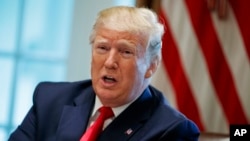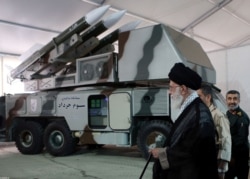VOA's Capitol Hill correspondent Michael Bowman and VOA Persian's Afshar Sigarchi contributed to this report.
Top U.S. and Iranian officials are continuing to fire verbal warning shots at each other while insisting they want to avoid war.
U.S. President Donald Trump said Wednesday in an interview with Fox Business News he does not want war with Iran "but we are in a very strong position if something should happen." He warned a conflict with the Islamic Republic "wouldn't last very long" and said he was "not talking boots on the ground."
Iranian Supreme Leader Ayatollah Ali Khamenei on Wednesday called the United States the "world's most vicious regime" and a "source of wars, conflict and plunder."
Days after being targeted with U.S. sanctions himself, Khamenei said, "Iranians have been wronged by oppressive sanctions but not weakened and remain powerful."
And he characterized the United States as deceiving other nations when it engages in negotiations.
An Iranian government official was quoted Tuesday as saying that sanctions on Khamenei equal an attack on the nation while Iran's president, Hassan Rouhani, said in a televised address that the White House's actions were "outrageous and idiotic."
The Iranian president said his country does not want war with the United States but will decisively respond to any aggression.
Trump has called the new sanctions order a "strong and proportionate" U.S. response to the downing of the unmanned U.S. military aircraft, which Washington says occurred in international airspace near the Strait of Hormuz, and Iran claims occurred over its airspace.
The U.S. leader said he imposed the sanctions because of a series of "belligerent acts" carried out by Iran, which U.S. officials say include Iran's targeting of Norwegian and Japanese ships traversing the Strait of Hormuz with mine explosions days before the attack on the drone.
"Whatever they want to do, I'm ready," Trump said Tuesday in the Oval Office.
Asked by a reporter what would be his exit strategy if war with Iran occurs, Trump replied: "You're not going to need an exit strategy. I don't need exit strategies."
The U.S. president, earlier in the day, on social media warned that an attack by Tehran on "anything American" would "be met with great and overwhelming force" — adding that in some instances, "overwhelming will mean obliteration."
In his series of Tuesday morning tweets, Trump dismissed as “very ignorant and insulting” Iran's statement hours earlier saying it was ending the possibility of diplomatic talks with the United States.
Vice President Mike Pence and acting Secretary of Defense Mark Esper are among the high-ranking U.S. officials making public comments that Washington does not seek war with Tehran.
Trump, meanwhile, is casting aspersions on the previous U.S. administration, again criticizing the international pact negotiated by former Secretary of State John Kerry and former President Barack Obama to restrain Iran's nuclear weapons development.
Trump withdrew from the 2015 agreement last year, reimposing sanctions aimed at debilitating Iran's economy to try to force it to engage in one-on-one nuclear negotiations with Washington.
The president’s latest tweets underscore a key point, according to a former National Security Council spokesman, Ned Price: “Trump tore up the Iran deal simply because it was signed by the previous administration.”
Price, also a former senior analyst at the Central Intelligence Agency, tells VOA “the only foreseeable off-ramp, which appears increasingly unlikely by the day, is that Trump puts his own branding on an agreement that is substantively identical to the Iran deal” of the Obama administration.
Price contends that national security adviser John Bolton and Secretary of State Mike Pompeo “don’t want a new deal. They want regime change whether or not it requires military force and leads us down the path of another catastrophic war in the Middle East.”
The Trump administration is saying it could also add sanctions targeting Iranian Foreign Minister Mohammad Javad Zarif.
Rouhani, in his speech, remarked, "You sanction the foreign minister simultaneously with a request for talks?"
Iran has repeatedly denied it was working to develop nuclear weapons, and the U.N. nuclear watchdog charged with monitoring the 2015 agreement has certified Iran is in compliance with the terms of the deal.
As the Trump administration has increased pressure on Tehran in recent months, and as Iran has complained that the other signatories to the nuclear deal have not done enough to help it maneuver around the U.S. sanctions, Iranian officials have pledged to stop abiding by certain restrictions it had agreed to, such as the amount of highly enriched uranium it can have.
"I think [Iran's recent actions] have made it more isolated," said Michael Pregent, a Middle East analyst at the Hudson Institute, in a Tuesday interview for VOA Persian’s News at Nine show. "They are losing friends, with Russia, China and Europe telling them: 'Stay in the Iran nuclear deal, don't move out of it, and don't take these aggressive actions in the Strait of Hormuz.'"







